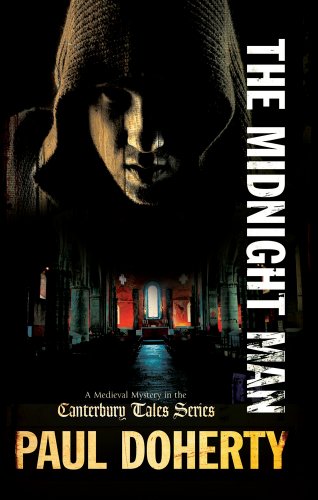The Midnight Man
This is the seventh in a series by Doherty that uses the clever structure of Chaucer’s Canterbury Tales on which to weave the tapestry of medieval mysteries and crimes that each “pilgrim” tells to the whole group. This one is the Physician’s Tale, and the best parts of the book are when we are in the company of the pilgrims, which isn’t all that often. The main characters of the tale being told are a pair of Carmelites, one Brother Anselm, an aging exorcist, and Stephen, the young novice unsure of his vocation, who accompanies him.
The story of murder, hauntings, Satanism, foul treachery and tragedy is as dark as the accompanying description of the fell backstreets of London where it takes place. Indeed, for my taste, Doherty overdoes the slime, the stench, the darkness, the danger and the overripe, lecherous, sinful, grasping bloody terror “darting out like tongues of hellish flames to disturb and harm the living”—not to put too fine a point on it. Both Stephen and Anselm see dead people, spirits, ghosts, demons and devils all around them, and have to constantly fight off the inroads the spirits make into the darker recesses, taunting the pair with their private desires and sins to make them lose faith.
There is barely a respite from this kind of description and activity throughout the book, which I found wearisome, as faithful as it may be in its depiction of the surroundings of the medieval mind and body. Coupled with a plenitude of colorful medieval monikers (Puddlicot, Parson Smollat, Amalric, Edith Swan-neck, Cutworth, Oldtoast and Mutton-monger, to name a few), the repetitious descriptions and somewhat confusing cast of characters don’t conceal the impression that the actual plot is thin, small and unoriginal. Not one of Doherty’s best.










